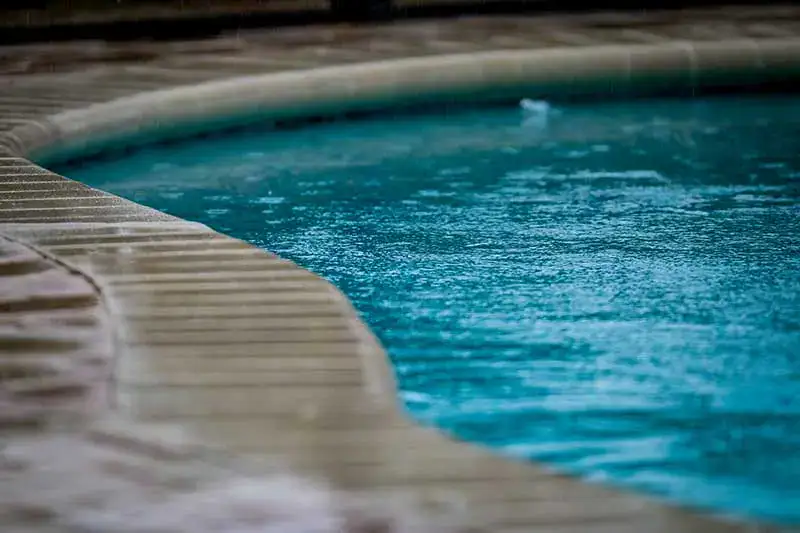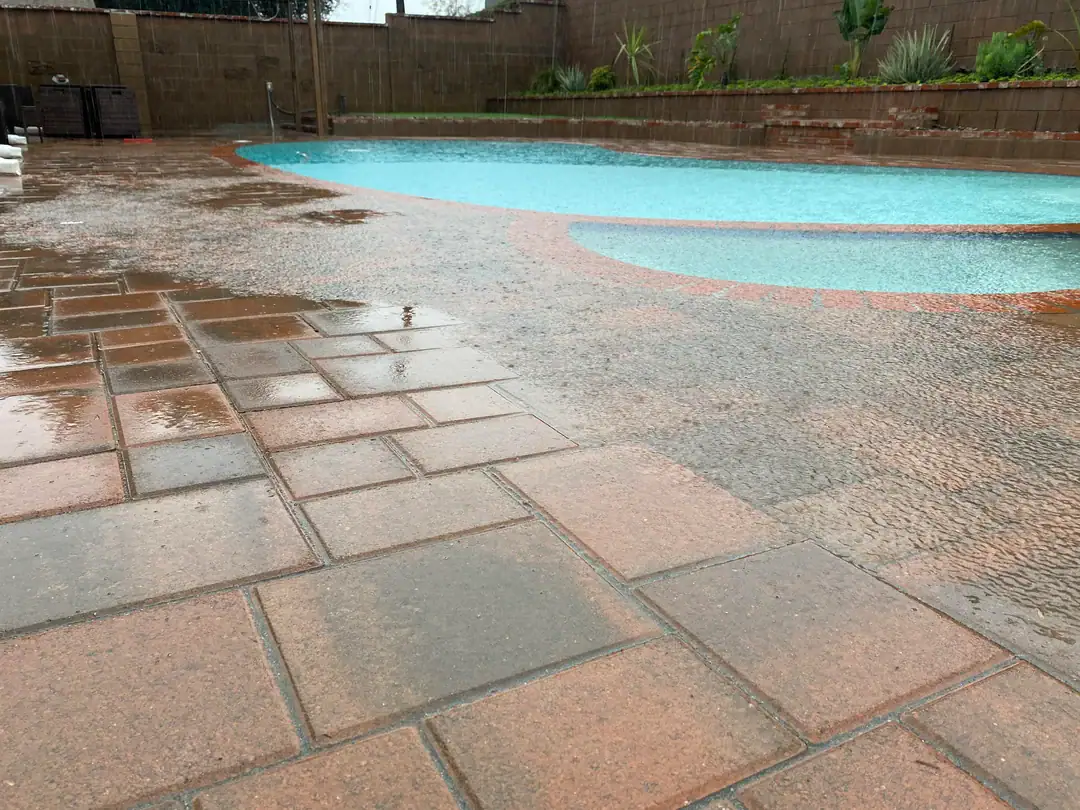How Rainwater Can Affect Your Swimming Pool

What is the worst thing you have ever found or seen in a swimming pool? Maybe it is a forest’s worth of leaves. Maybe it is a pile of dead worms.
Me personally? In my time as a pool boy here at Royal Pools G2 Landscaping, the worst thing I ever found in a pool was a dead skunk. Not fun.
You may be thinking, “Well, that’s the worst thing that can get in a pool.” It just might be. Dead skunks in swimming pools are uncommon. Rainwater getting into pools happens all the time.
Ideally, we would be able to track and observe everything inside our pools, but we can’t. That’s why it is so important to test your pool water chemistry as often as possible. Especially after it rains.
Knowing how rainwater affects a pool is the first step to stopping it. After all, it is easier to handle something when you know what you’re looking for. With that being said, how can rainwater affect your swimming pool? Let’s dive in.
Rainwater Effect #1:
Changes the Pool Water Chemistry

Rainwater typically has a pH between 5 and 5.5, meaning it is acidic. As you can imagine, that is not the water you want in your pool. The proper range for pH in pool water is anywhere between 7.2 and 7.8.
Heavy rain on an uncovered swimming pool will likely lead to the pool’s pH dropping too low. You will want to remedy this as quickly as possible, as acidic water could cause the pool to cloud up.
Always be sure to monitor your pool water chemistry during rainstorms. Rain is soft and can affect more than just pH. Calcium hardness levels could drop. If you have a saltwater swimming pool, rainwater could dilute the salt content as well.
Covering the pool will take care of this issue. A solar cover on an aboveground pool will keep the water warm, but it will not keep out all the rain. For inground pool owners seeking the best coverage, we recommend an automatic pool cover.
Rest assured, small amounts of rain won’t drastically change water chemistry. Regardless, testing your water chemistry after rain is never a bad idea.
Adjusting pool water chemistry requires a lot of care. Daily at-home testing and weekly professional testing are the best way to go. You’d be surprised how much can change by adding too much or too little of one chemical.
An excessive amount of any liquid is sure to throw off the water chemistry of your pool. Rain is perhaps the peskiest example.
Rainwater Effect #2:
Adds Debris and Contaminants to the Water
Dealing with direct rainfall in your pool is one thing. Dealing with extra runoff rainwater is another annoying hassle all on its own.
Rainwater gathers all over the place during a storm. The deck around the pool, the gutters, etc.
Runoff water will bring unwanted debris and other contaminants into your pool. Always focus on removing the biggest pieces of debris you see. You do not want anything clogging your pump or filter.
Rainwater Effect #3:
Could Damage Pool Equipment
Acidic water will damage plaster and metal surfaces. This can include handrails, ladders, and steel walls behind a vinyl liner.
This is another reason why it’s so important to monitor water chemistry before, during, and after a rainstorm to ensure that the chemistry stays as balanced as possible.
If you experience a heavy rainstorm and your swimming pool is uncovered, it is recommended that you clean your filter afterward to clear out any buildup of debris or contaminants that may have entered the pool via rain and runoff water.
Rainwater Effect #4:
Can Raise Water Level

The recommended water level for an inground pool is about halfway up the skimmer face plate. A heavy rain pour can raise the water level above the proper height. If this happens, drain the water down to the proper level (midway up the skimmer). Draining water can change the chemistry as well, requiring an adjustment.
Conclusion
Dealing with the natural elements is just one part of maintaining a swimming pool. Rainwater is annoying, we get it, but a few simple steps can solve any problem that rainwater creates.
Reminder: Always keep the pool closed during rainfall to avoid rainwater effects as much as possible.
If you don’t have a cover, just remember to check the water chemistry as often as possible during rain time and make the proper adjustments when the rain has stopped.
For more educational content on all things pools and landscaping, check out our learning center above. Below are a few articles to get you started!
Pool Water Test Strips vs. DPD Test Kits vs. Digital Water Labs: Which is Best?
How Often Do I Need to Get My Pool Water Tested?
How To Close An Inground Swimming Pool For The Winter
Written By Logan Edgemon
